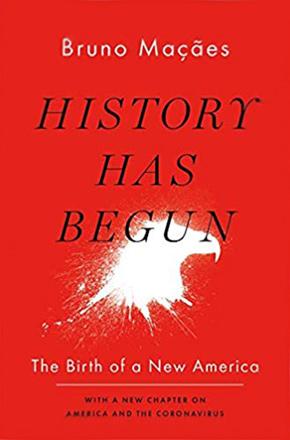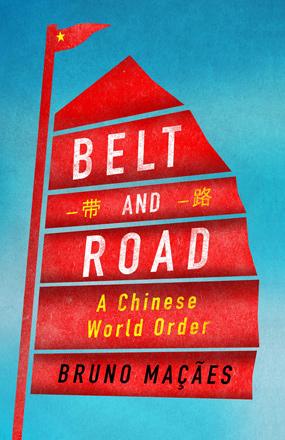You are here
Is politics just like show business?
By Sally Bland - Nov 01,2020 - Last updated at Nov 01,2020

History Has Begun: The Birth of a New America
Bruno Macaes
London: Hurst and Co., 2020
Pp. 189
The title of this book seems to be a retort to Francis Fukuyama, the American political scientist who proclaimed the end of history in his famous 1989 article. With the collapse of the Soviet Union and the concurrent spread of liberal democracy and free-market capitalism, Fukuyama postulated that humanity’s sociocultural evolution might be coming to an end (though he later modified this claim). Now, thirty years later, Bruno Macaes, researcher and political commentator, argues quite the opposite. Interlacing a host of historical, philosophical, political and cultural sources with his own observations, he enters the debate on whether the American empire is on the decline or not. He postulates that rather than declining, the US has been reinventing itself over the past several decades: “perhaps the United States is only entering its highest period, where its individual possibilities will be realised”. (p. 11)
In his words: “This book is an attempt to examine the subtle processes by which a new way of looking at the world slowly extends to every facet of individual and collective life... My second and more ambitious task is to attempt to decipher the logic of this new [American] civilisation.” (p. xiv)
Starting with the country’s beginning as an extension of Europe, Macaes traces how it gradually embarked on its own independent trajectory. In this context, he critiques French diplomat and historian Alexis de Tocqueville (1805-1859) for being unable to see “that America is meant to outgrow Europe and create its own distinctive path”. (p. 35)
Noting that American society, in some respects, has more in common with Asia than with Europe, the author goes on to say, “If ever the United States becomes convinced that the West belongs to the past, it could leave Europe living in the past, but it will not be inclined to remain there itself, especially if that would entail sacrificing the thing to which it is most addicted: global primacy.” (p. xiii)
Macaes chronicles the rise of US manufacturing and military prowess, highlighting the results of the two world wars, the Marshall plan, the Cold War and Americans’ increasing cosmopolitanism, as the US began to decisively influence Europe rather than the other way around. He explains why the US is more ready to use blunt military force than Europe, and why it is wary of the principles of international law and multilateralism that Europe advocates. The author’s writing style is saucy and often humorous as well as to-the-point, as when he writes, “Americans see the world as an action movie, Europeans as a documentary.” (p. 67)
Macaes’s most original and provocative assertations are those linking American politics to culture, citing many philosophers, novels and films to prove his claims. With the worldwide spread of American television and Hollywood movies, reality and unreality began to merge in politics, aided by the birth and growth of high-tech in Silicon Valley. “For the next four decades [the 1970s and beyond], American politics and American business would never cease approaching the ideal point where they would be indistinguishable from Hollywood. Reagan said that politics was just like show business.” (p. 80)
The ever-widening gap between reality and fantasy generated many crises, most notably the Iraq and Afghanistan wars. Still, with the aid of television and then the internet, America seems to offer unlimited choices, new possibilities, dreams and meaning. According to Macaes, the “principle of unreality is an answer—specifically an American answer—to the shallowness of life in a modern liberal society”. (p. 138)
In trying to pinpoint the new American civilisation, the author offers his own explanations for several particularly American traits which diverge from European values, such as clinging to guns, the death penalty, prisons, religiosity and lack of universal health coverage.
One inevitably connects the subject matter of this book to the current American administration and presidential elections, but Macaes insists that the unreality principle began decades ago. He concurs with those who say that “Trump is not really about Trump or the product of a fluke election, but a vivid example of the world of contemporary American, where commerce and the media reward performance above truth-telling... the pleasure principle above the reality principle.” (p. 115)
“History Has Begun” is both interesting and provocative to read. While Macaes’s characterisation of contemporary American culture rings true in many if not most respects, his book does not cover issues like income inequality, changing demographics, persistent racism, gender roles, etc., that preoccupy Americans today and may keep them from experiencing “the shallowness of life in a modern liberal society”. The book is rather about the idea of America, as it was launched and developed by what was originally (and in most cases still is) an all-male, white-dominated, upper- and middle-class leadership.
Related Articles
Belt and Road: A Chinese World OrderBruno MacaesLondon: Hurst & Co., 2018Pp.
The Literary Influence of the Mediaeval Arabian Nights on Gabriel Garcia Marquez and Novelists of the Arab WorldAida O.
While 40 years of seldom-interrupted stability under Hafez and Bashar Assad’s rule may make today’s chaos appear as an anomaly



















